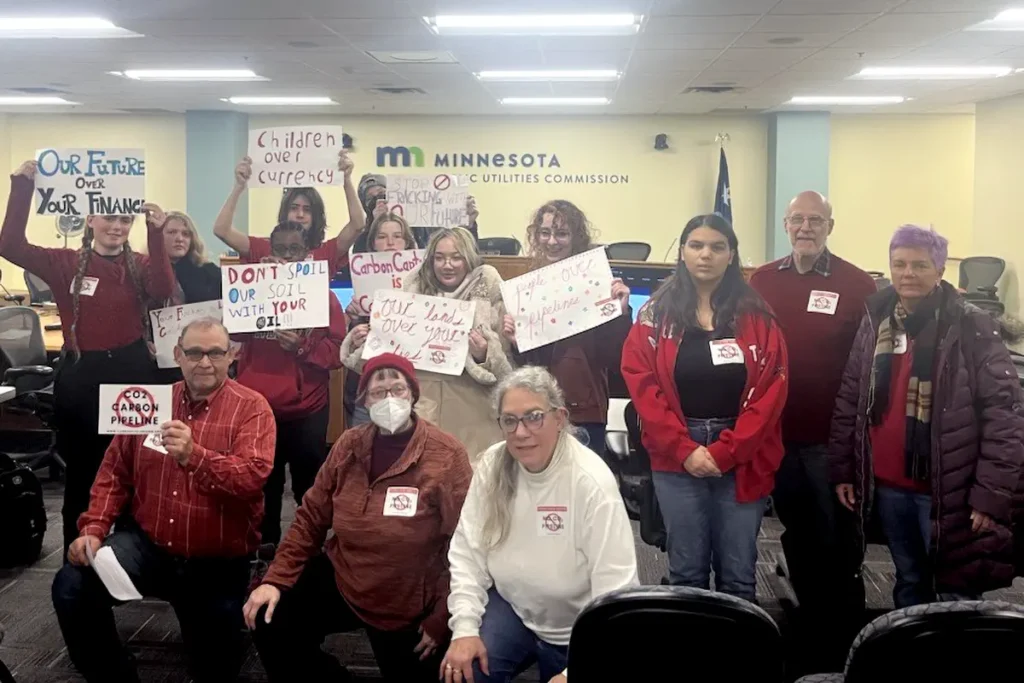CURE and community members express anger and disappointment at the decision
On Thursday, December 12th, the Minnesota Public Utilities Commission (PUC) granted the route permit for Summit Carbon Solutions’ proposed carbon dioxide (CO2) pipeline in Otter Tail and Wilkin Counties. However, the PUC placed a number of conditions on the permit, including prohibiting Summit from building in Minnesota before it has secured all permits and started construction in North Dakota on the pipeline and storage site. Summit’s lawyer stated at the meeting that construction at the storage site would not begin until “sometime” in 2026.
The segment permitted today was for 28-miles of pipeline that will run from the Green Plains Ethanol facility in Fergus Falls to the North Dakota border by Breckenridge. It is part of the much larger 2,500 mile Midwest Carbon Express CO2 pipeline network planned across parts of southern Minnesota, Iowa, South Dakota, and North Dakota. Along with CURE, the Minnesota Center for Environmental Advocacy and the Sierra Club argued against the approval at the PUC.
Today’s decision is a dereliction of the PUC’s duty to the public and sets a low bar for this first-of-its-kind project. The record shows clear risks from this project and a lot of unanswered questions by Summit. Minnesotans weighed in against Summit’s pipeline proposal by a 100-to-1 ratio, but instead of listening to community members, the commissioners paved the way for a project that risks our lands, waterways, and public health.
–Sarah Mooradain, Government Relations & Policy Director, CURE
Landowners and community members who live in the footprint of Summit’s project and attended the PUC meeting expressed dismay at the outcome.
With all due respect to the Commissioners, I was disappointed by the cavalier attitude they showed about the impact to our land and homes. The dismissal of the long-term impacts to crop yields, the lack of discussion about water use–these are the things that people in the area care about. But the PUC doesn’t seem to take them seriously.
–Tony Kramer, landowner and farmer from Redwood County
Indigenous allies who attended the meeting also pushed back against the arguments made that Summit’s project has climate benefits.
False Solutions are still a form of colonization. Summit’s pipeline directly impacts indigenous people. We need to end the fossil fuel industry with this false perception that carbon capture is a solution.
– Standing Rock Grassroots and Waste Wakpa Grassroots
A number of commissioners did note concerns that Summit’s project could be on shaky ground, relying on “tenuous” federal tax credits that could see substantial changes under a Trump administration and having not secured key permits in a number of states. They also reiterated, and Summit confirmed, that the permit does not give the company eminent domain powers in Minnesota and the company will have to secure voluntary agreements for the entire route before construction can begin.
Summit’s original timeline for building this project is already behind by a number of years and to date they haven’t applied for a permit for the hundreds of other miles of pipeline they say they want to build here in Minnesota. While today’s decision resolves some immediate questions for the company for this 28-mile route, they will not be putting pipeline in the ground in Minnesota anytime soon. A lot can happen in the meantime.
–Maggie Schuppert, Campaigns Director, CURE
After the PUC issues a written order in the next few weeks codifying today’s decision, parties will have 20 days to formally petition the Commission to reconsider its pipeline approval.


